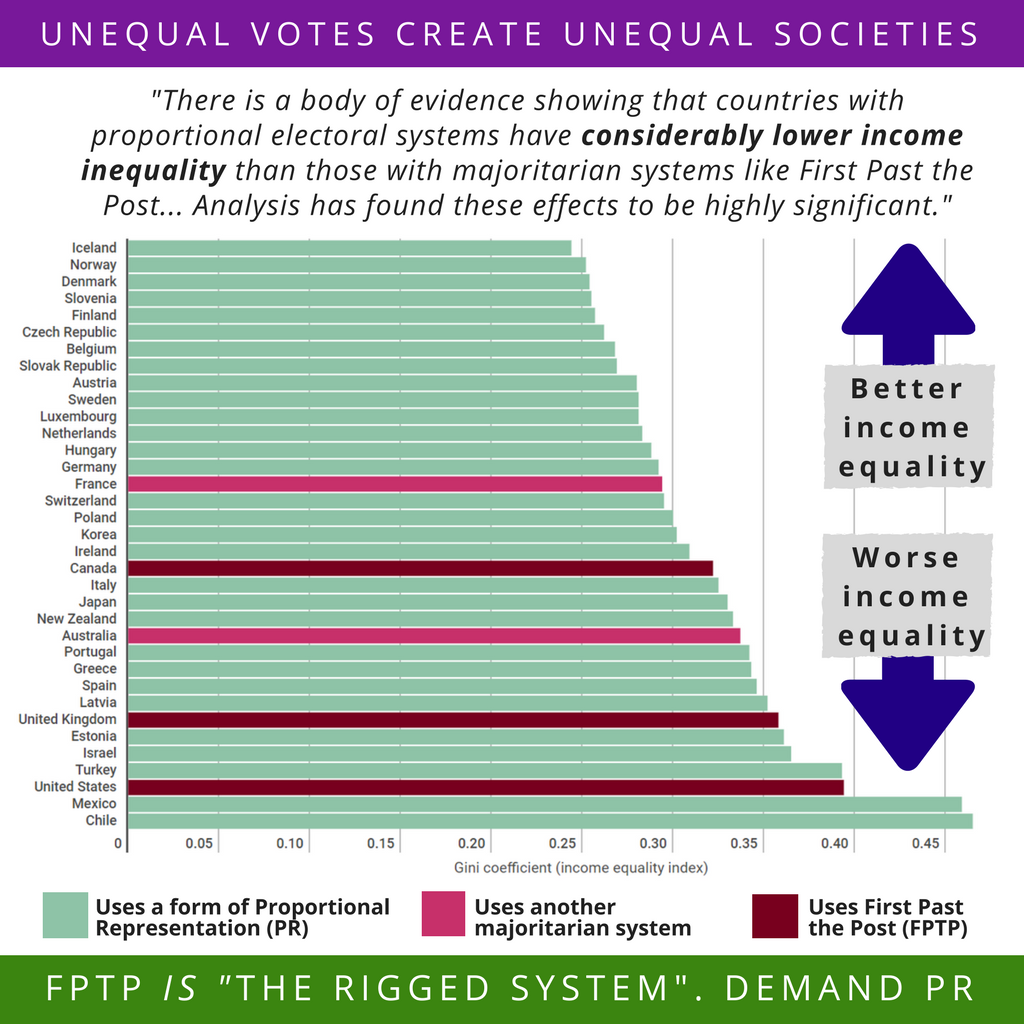Proportional Representation is not just better for democracy, but has associated positive outcomes relating to equality. Links between proportional voting systems and reduced inequality have been observed in countries the world over.
Income Inequality
Studies have found that countries with proportional electoral systems have considerably lower income inequality than those with majoritarian systems like First Past the Post. Based on the evidence, political scientists have concluded there’s a causal relationship at work; countries with PR "tend to reduce income inequalities whereas majoritarian institutions have the opposite effect” and that when the degree of proportionality of a system increases, income inequality decreases. Analysis has found these effects to be highly significant, with PR accounting for 51% of the variance of income inequality among countries (Birchfield and Crepaz, 1998)
Countries with PR also tend to have a more equal distribution of public goods. A 2009 study by Carey and Hix found that countries using PR achieved higher scores on the United Nations Index of Human Development, described as “a reasonable overall indicator of government performance in the delivery of public goods and human welfare."
For a more detailed discussion of the impact of voting systems on economic equality, see our joint reports with the Labour Campaign for Electoral Reform: The Many, Not the Few (2017), and Peterloo 200 (2019).
Gender Equality
First Past the Post has been called "the world's worst voting system for achieving gender balance" in politics (Kuper, 1990). Just 34% of MPs elected to Westminster in 2019 were women. Numerous studies have found that countries with Proportional Representation produce a better gender balance (Matland, 1998; Reynolds, 1999). Every single country with more than 40% female MPs in its primary legislature uses a proportional voting system.
In fact, research shows that on average, the share of women elected to parliamentary bodies is 8 percentage points higher in countries that use a proportional method of electing representatives.
References:
Birchfield, Vicki and Crepaz, Markus (1998). “The Impact of Constitutional Structures and Collective and Competitive Veto Points on Income Inequality in Industrialized Democracies.” European Journal of Political Research 34: 175-200.
Carey, John M. and Hix, Simon (2009). “The Electoral Sweet Spot: Low-magnitude Proportional Electoral Systems.” PSPE Working Paper 01-2009. Department of Government, London School of Economics and Political Science, London, UK
Lijphart, Arend (2012). “Patterns of Democracy.” Yale University Press, New Haven, CT, USA
Kuper, Richard (1990). Electing for democracy: Proportional Representation and the left. Worcester: Socialist Society.
Matland, R. (1998). Women’s representation in national legislatures: Developed and developing countries. Legislative Studies Quarterly, XXIII, 1, 109–125.
Reynolds, A. (1999). Women in the legislatures and executives of the world: knocking at the highest glass ceiling. World Politics, 51(4), 547–572.
Make Votes Matter is a single-issue campaign for Proportional Representation in the House of Commons and encourages all parties, candidates and MPs to support PR. It does not endorse any party or candidates and takes no position on other political issues.
Join us on Facebook and Twitter and be part of the movement to win Proportional Representation!



